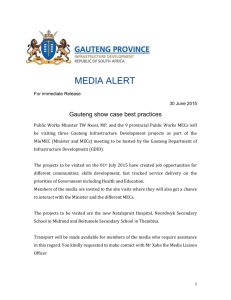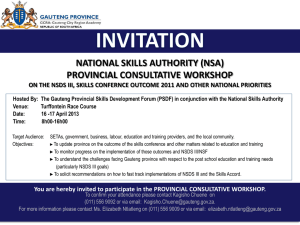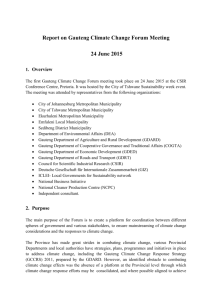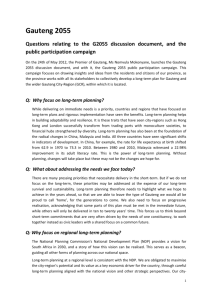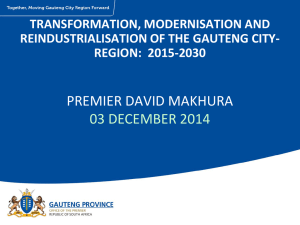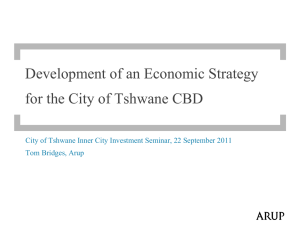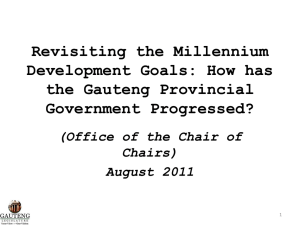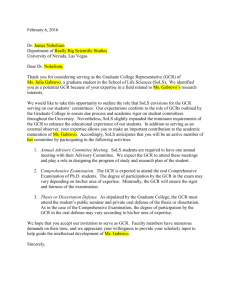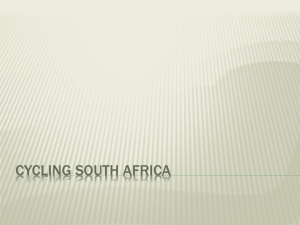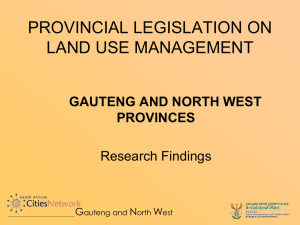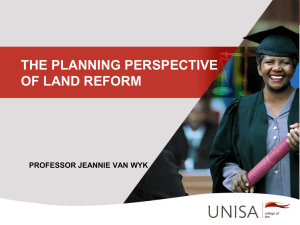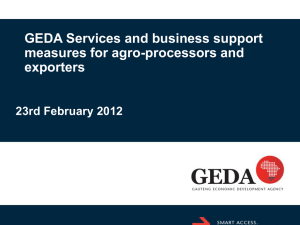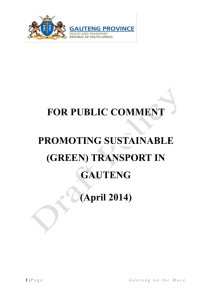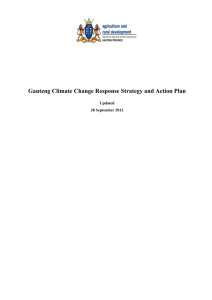Presentation to the JSE by Premier David Makhura
advertisement
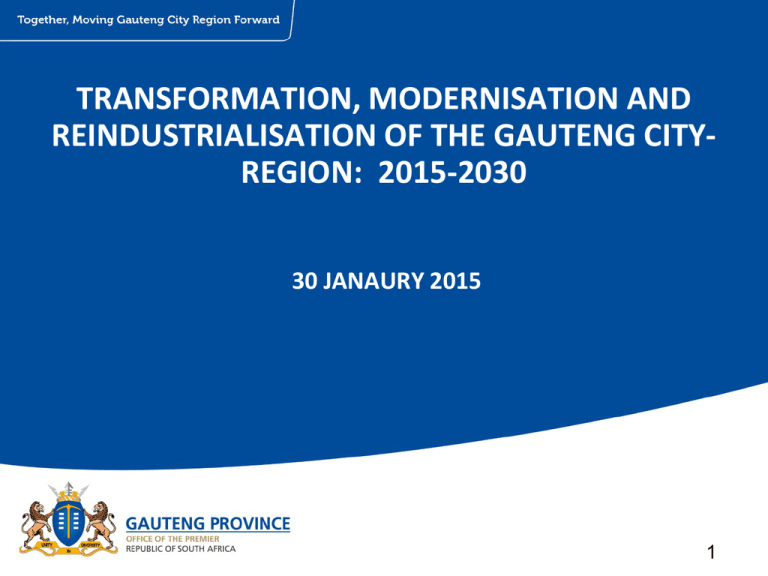
TRANSFORMATION, MODERNISATION AND REINDUSTRIALISATION OF THE GAUTENG CITYREGION: 2015-2030 30 JANAURY 2015 1 INTRODUCTION • I would like to thank you for joining us to share our vision of the Gauteng City Region for the next fifteen years in line with the NDP, Vision 2030. Let me start by thanking Ms Newton-King, the CEO of the JSE, for agreeing to partner with us in growing and developing the economy of the Gauteng City Region. • I have brought with me Team Gauteng City Region, Members of the Executive Council and Mayors of the Cities that constitutes the Gauteng City Region; City of Joburg, Ekurhuleni Metro, City of Tshwane, Sedibeng and the West Rand District Municipalities and senior officials in government. • The year 2015, precedes the local government elections. I have brought our Mayors because they run and manage our cities and many of you have issues to raise with them, this is the day. 2 UNDERSTANDING GAUTENG AS A CITY REGION: PAST, PRESENT AND FUTURE OUR VISION: Building Gauteng into a seamless, integrated, socially cohesive, economically inclusive region, underpinned by smart industries and sustainable development. 3 4 UNDERSTANDING THE GAUTENG CITY-REGION • Gauteng has evolved into an industrial hub, financial nerve centre and technological heartbeat of our country, owing to the impact of the mining revolution on SA’s path to industrialisation. • Today our province contributes more than 34% to our country’s GDP and contributes 42% of SA’s industrial output. The size of the Gauteng economy is 1.07 Trillion. • We also contribute more than 10% to Africa’s GDP. 5 UNDERSTANDING THE GAUTENG CITY-REGION • The Gauteng Province by land is 1.4%, yet it remains the economic engine of the country. • The development of what became Gauteng province in 1994 bears unique industrial and economic features – an urban conurbation and clustering of cities and towns. This is what makes Gauteng a City Region, like the City states such as Singapore. 6 7 UNDERSTANDING THE GAUTENG CITY-REGION • The cluster of cities and towns that make up the GCR are: – City of Joburg: the Financial Hub of the GCR – evolved from mining into Financial Hub of the City Region; including ICT, Pharmaceutical, Retail and Services. – Ekurhuleni Metro: the Manufacturing Hub – Manufacturing, Logistics and Transport Hub, Airspace and Defence industries whose industrial footprints extends to Witbank and Secunda. Seen significant de-industralisation. New economy – an Aerotropolis SEZ/IDZ (economy based on airport and logistics; manufacturing and beneficiation. 8 UNDERSTANDING THE GAUTENG CITY-REGION – City of Tshwane: Administrative Capital has become a key driver of knowledge, innovation and automotive industry development – link to Rustenburg and Waterberg (new giants linked to platinum and coal mining). – West Rand District: was a powerful mining region extending to Klerksdorp and Potchefstroom that has undergone significant de-industrialisation due to the decline of the mining industry. New economy - agribusiness/agroprocessing and green and blue economy will be the future. Consolidation of municipalities into a single metro – part of Agritropolis. – Sedibeng District Municipality: steel industry and associated manufacturing and energy drove the economy. De-industrialisation due to decline of steel. New economy to be anchored on steel, Vaal river, tourism, agriculture linked to Sasolburg – Vaal River City and part of Agritropolis 9 GAUTENG CITY REGION PLAN 2030 10 TMR AND THE TEN PILLAR PROGRAMME The Imperatives of the Fifth Administration (Ten Pillar Programme): • Radical economic transformation • Decisive spatial transformation • Accelerating social transformation • Transformation of the State and governance • Modernisation of the economy • Modernisation of the public service • Modernisation of human settlements and urban development • Modernisation of public transport infrastructure • Re-industrialise Gauteng • Lead in Africa’s new industrial revolution 11 12 FUNDING THE GAME CHANGERS FOR THE GAUTENG CITY REGION 13 WHY THE GAME CHANGERS • Aimed at promoting development throughout the GCR • Catalytic in nature with ripple effect and have potential to take the GCR to a higher trajectory of economic growth and development • Have a major infrastructure component in the project content. • Support radical spatial, social and economic transformation • Be based on multi-year inter-governmental and inter-departmental collaboration and cooperation and in partnership with the private sector • Promote and support economic development and job creation • Lead to improved service delivery, entrenching of good governance, deepening of democracy and strengthening partnerships • Because of the fiscal limitations, we are developing innovative approaches to funding the Game Changers and this includes crowding private investment 14 REVITALISATION OF TOWNSHIP ECONOMIES STATUS DESCRIPTION COMPONENTS We have adopted a Township Economy Strategy with a detailed action plan. Our aim is to Transform townships into vibrant economic centres of opportunity and job creation • Clothing and Textile • R160 mil allocated Hub funding to respond to • Furniture Hub the challenges faced by • Steel Fabrication township SMMEs, Hub cooperatives and • Confectionery Hub entrepreneurs. • Working with the JSE to establish a township bond. • Leveraging private sector investment (creating linkages and mentorship opportunities i.e. Waterfall City to host an Incubation Hub) 15 AEROTROPOLIS DESCRIPTION COMPONENTS This is an important GCR Project aimed at leverage the potential the three big airports in the GCR as economic engines for sustainable growth and job creation (to be anchored along ORTIA, Lanseria and Wonderboom Airports) • • • • • • STATUS Expansion of ORTIA • We are setting Gauteng IDZ (SEZ) up a provincial Jewellery Park Aerotropolis Science Park Agency, drive at ICT Connectivity the provincial Upgrading of road, level, which will rail, electricity & look at the water and institutional and • Manufacturing and financing of the beneficiation entire project. Committee 16 GAUTRAIN EXPANSION AND EXTENSION DESCRIPTION COMPONENTS STATUS To increase accessibility and improve mobility by expanding and extending the current network • • • • • ORTIA platform extension Additional rolling stock System operational optimisation To extend the network by 200km to ensure it covers the North Eastern and South Western regions including Lanseria & Ruimsig • • Feasibility studies for extensions underway Extension of existing parking facilities also identified as priority to address capacity constraints Plans to improve linkages with other public transport modes like the BRTs 17 ENERGY MIX AND GAUTENG GREEN AGENDA DESCRIPTION COMPONENTS STATUS To respond to the energy generation and distribution in the GCR. Gauteng Energy Steering Committee has been established, to work towards establishing a GCR energy mix mechanism, work with independent power producers, to generate and distribute energy, including outside of the grid. • Waste to energy projects ( • Feasibility studies in CoJ, West Rand & Sedibeng) this regard have • Tri-generation, gas & roof-top been done; solar projects Sedibeng and West • Energy efficiency Rand on Waster-tointerventions taking place at Energy GPG buildings including an • We will invite all ongoing Energy Audit independent power • The rolling out of Solar generators to help Water Heaters across the us with solutions in GCR this regard. 18 ICT AND BROADBAND CONNECTIVITY FOR THE GCR DESCRIPTION COMPONENTS STATUS To establish a hi-speed capacity network across Province in support of effective governance, service delivery and economic growth • Broadband Networks (GBN, Sedibeng, CoJ, Tshwane) Smart classrooms Electronic Health Information System Biometrics for housing beneficiaries Gauteng Ntirhisano Service Delivery War Room Installation of Core Network continuing with 5 of 6 core network sites connected We are working towards establishing Nasrec as the GCR ICT SEZ Pre-feasibility study concluded and being assessed, and are working with DTI and Telecommunications to finalise the decision of establishing a fully fledged SEZ • • • • To encourage growth in ICT sector through services & infrastructure • Secondary access network aims to link 137 additional sites 19 SPATIAL TRANSPORT TRANSFORMATION STRATEGIC PROJECT DESCRIPTION METROPOLITAN BRT SYSTEMS To increase accessibility by completing metro systems with potential extensions • • • • Rea Vaya (CoJ) Running A Re Yeng (CoT) (2014) Ekurhuleni BRT (2016) Extension to West Rand & Sedibeng Implementation in 3 metros. Extensions require feasibility studies Interventions being planned to increase connectivity across the three metros and extension to the West Rand and Sedibeng METRORAIL UPGRADE To implement 25 year ITMP specifically moving passenger transport from road to rail • • Moloto Corridor (CoT) Mabopane-Pretoria link (CoT) Branch-line improvement programme Assembly site for new rolling stock confirmed in Nigel To increase economic efficiency by improving the regional flow of goods through the expansion of freight & logistics hubs • City Deep expansion (CoJ) Tambo Springs (EMM) Sentrarand Pyramid Possible further hubs in the West Rand and Sedibeng City Deep and Tambo Springs underway GAUTENG FREIGHT AND LOGISTICS HUBS COMPONENTS • • • • • STATUS 20 AGRITROPOLIS DESCRIPTION To support the development of the Agri-sector and ensure job creation from increased agriactivity COMPONENTS • Upgrading of the Vereeniging Market, including in the MidVaal • Agro-processing facilities • Upgrade road and rail links STATUS SCM process for feasibility study currently underway 21 SUSTAINABLE HUMAN SETTLEMENTS FROM THE PROVINCIAL FISCUS DESCRIPTION We are ending the RDP developments. We are developing and sustainable settlements on well located land, with socioeconomic opportunities. COMPONENTS • Mega Human Settlement Projects eg: o Lufhereng o Savannah City o Masingita City o Syferfontein o Ratanda o Boiketlong o Zithobeni STATUS There are 38 Mega Projects and are within our fiscus over the MTEF. However we will need to partnership with the private sector going forward. 22 PARTNERSHIP ON PRIVATE SECTOR LED INVESTMENTS DESCRIPTION • The GCR has identified the following projects, which are aimed at facilitating and enabling the development of new nodes that will significantly transform the spatial form of the province. AREA OR NAME OF THE DEVELOPMENT • Sedibeng Region • River City – SDM • Gauteng Highlands – SDM • Savanna City – SDM • Arcerlormittal, housing developments • City of Joburg • Modderfontein • Waterfall City • Steyn City • Lanseria • Masingita City • Linksfield • River sands • West Rand Region • Thusanang City, Westonaria • Ebony Mine, • City of Tshwane • New city in Nokeng • New Centurion City • Capital City Development • Ekurhuleni • The work includes our partnership with SOE, PRASA , Transnet and ACSA STATUS • • We have met all the developers and are working with them by investing in bulk infrastructure. We are working with Municipalities to speed up processes of regularisation and all approvals required 23 CONCLUSION • • To support private sector investment into the GCR economy we are determined to reduce the cost and improve the ease doing business in the GCR, through addressing: – Administrative inefficiencies including across the three spheres of government – Improving transport and logistics infrastructure – Supporting skills development – Reducing the cost of living – Addressing issues of crime – Building integrity within government – Addressing the cost of inputs such as electricity and utilities through developing an energy mix intervention and broadband connectivity and, – Working towards water and energy security Over the next 15years, we would like to unleash the full energies of all our businesspeople and unlock the full potential of all 11 sectors of our provincial economy. 24 WE ARE OPEN FOR BUSINESS TOGETHER, MOVING GAUTENG CITY REGION FORWARD! THANK YOU! 25
